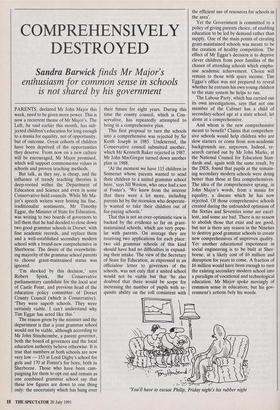COMPREHENSIVELY DESTROYED
enthusiasm for common sense in schools is not shared by his government
PARENTS, declared Mr John Major this week, need to be given more power. This is now a recurrent theme of Mr Major's. The Left, he said earlier this month, has sub- jected children's education for long enough to a mania for equality, not of opportunity, but of outcome. Great cohorts of children have been deprived of the opportunities they deserve. From now on a new culture will be encouraged, Mr Major promised, which will support commonsense values in schools and proven teaching methods.
But talk, as they say, is cheap, and the influence of trendy teaching theories is deep-rooted within the Department of Education and Science and even in some Conservative-held councils. While Mr Ma- jor's speech writers were honing his fine, traditionalist sentiments, Mr Timothy Eggar, the Minister of State for Education, was writing to two boards of governors to tell them that he had decided to close down two good grammar schools in Dorset, with fine academic records, and replace them and a well-established secondary modern school with a brand-new comprehensive in Sherborne. The desire of the overwhelm- ing majority of the grammar school parents to choose grant-maintained status was ignored.
`I'm shocked by this decision,' says Robert Spink, the Conservative parliamentary candidate for the local seat of Castle Point, and previous head of the education policy committee of Dorset County Council (which is Conservative). They were superb schools. They were certainly viable. I can't understand why Tim Eggar has acted like this.'
The reason given by the minister and the department is that a joint grammar school would not be viable, although according to Mr John Stinchcombe, a parent governor, both the board of governors and the local education authority believe otherwise. It is true that numbers at both schools are now very low — 153 at Lord Digby's school for girls and 170 at Foster's for boys, both in Sherborne. Those who have been cam- paigning for them to opt out and remain as one combined grammar school say that these low figures are down to one thing only: the uncertainty which has hung over their future for eight years. During this time the county council, which is Con- servative, has repeatedly attempted to bring in a comprehensive plan.
This first proposal to turn the schools into a comprehensive was rejected by Sir Keith Joseph in 1985. Undeterred, the Conservative council submitted another, which Mr Kenneth Baker rejected in 1987. Mr John MacGregor turned down another plan in 1988.
`At the moment we have 115 children in Somerset whose parents wanted to send their children to a united grammar school here,' says Jill Weston, who once had a son at Foster's. 'We knew from the interest that there were a lot more, including parents hit by the recession who desperate- ly wanted to take their children out of fee-paying schools.'
That this is not an over-optimistic view is backed by the evidence so far on grant- maintained schools, which are very popu- lar with parents. On average they are receiving two applications for each place: two old grammar schools of this kind should have had no difficulties in expand- ing their intake. The view of the Secretary of State for Education, as expressed in an officialese letter to governors of the schools, was not only that a united school would not be viable but that 'he also doubted that there would be scope for increasing the number of pupils with re- quisite ability on the roll consistent with the efficient use of resources for schools in the area'.
Yet the Government is committed to a policy of giving parents choice, of enabling education to be led by demand rather than supply. One of the main points of creating grant-maintained schools was meant to be the creation of healthy competition. The effect of Mr Eggar's decision is to deprive clever children from poor families of the chance of attending schools which empha- sise academic achievement. Choice will remain to those with spare income. Tim Eggar's office was not prepared to reveal whether he entrusts his own young children to the state system he helps to run.
The Labour Party, which has carried out its own investigations, says that not one member of the Cabinet has a child of secondary-school age at a state school, let alone at a comprehensive.
And whom is the new comprehensive meant to benefit? Claims that comprehen- sive schools would help children who are slow starters or come from non-academic backgrounds are, unproven. Indeed, re- search carried out by Mr John Marks, at the National Council for Education Stan- dards and, again with the same result, by the DES, found that pupils at the remain- ing secondary modern schools were doing better than those at Ilea comprehensives. The idea of the comprehensive sprang, in John Major's words, from a mania for equality, a disease which he has now rejected. Of those comprehensive schools created during the unfounded optimism of the Sixties and Seventies some are excel- lent, and some are bad. There is no reason to abolish those that exist and are good, but nor is there any reason in the Nineties to destroy good grammar schools to create new comprehensives of unproven quality. Yet another educational experiment in social engineering is to be built at Sher- borne, at a likely cost of £6 million and disruption for years to come. A fraction of £6 million would have been enough to turn the existing secondary modern school into a paradigm of vocational and technological education. Mr Major spoke movingly of common sense in education; but his gov- ernment's actions bely his words.
'You'll have to excuse Philip, Friday night's his rubber night


















































 Previous page
Previous page